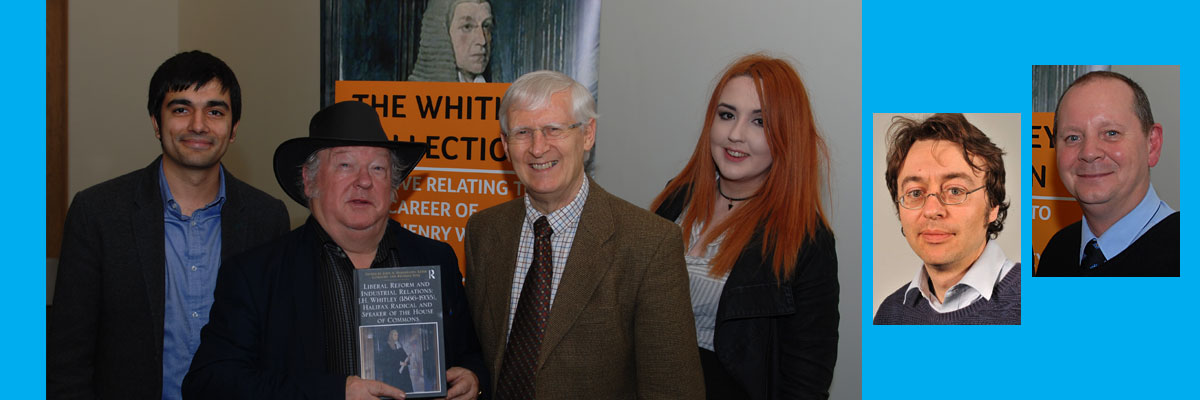Halifax-man J.H. Whitley was the House of Commons Speaker from 1921-1928
AN important but unsung figure from a turbulent period of British politics has become the subject of a book for the first time.
Historians at the University of Huddersfield have played a key role in editing and writing the newly-published volume, which analyses the life and times of Halifax-born J.H. Whitley. Liberal MP for his home town, he was Speaker of the House of Commons from 1921-1928, the period that saw the first Labour Government and experienced a General Strike.
Story continues below...
 Book editors and contributors (l-r) Amerdeep Panesar, Professor Keith Laybourn, Dr John Hargreaves, Amy Stoddart, Professor Richard Toye and Professor Paul Ward
Book editors and contributors (l-r) Amerdeep Panesar, Professor Keith Laybourn, Dr John Hargreaves, Amy Stoddart, Professor Richard Toye and Professor Paul WardA preface to the new book is provided by the current Speaker, John Bercow. He is one of a sequence of distinguished politicians and writers who have delivered the annual J.H. Whitley Lecture, a series that began in 2012 after a collection of Whitley’s papers, books and photographs was deposited in the University of Huddersfield’s archives by his descendants.
This has led to scholarly investigation of Whitley’s life and legacy and to the new book, edited by the University of Huddersfield’s Professor Keith Laybourn, a leading expert on Labour history and Dr John Hargreaves, whose books include a definitive history of Halifax. They were joined by Professor Richard Toye of the University of Exeter, who delivered the inaugural J.H. Whitley Lecture.
The book has 13 chapters, dealing with topics that range from Whitley’s upbringing in Halifax and his involvement in its radical late 19th century politics, through his pioneering development of joint industrial councils – an innovation that created international interest – his period as Speaker and his chairmanship of the BBC from 1930 until his death in 1935.
There is also a chapter dealing with Whitley’s 1929-31 spell as Chairman of the Royal Commission on Labour in India. This is co-authored by Paul Ward, who is the University of Huddersfield’s Professor of Modern British History and overseer of the J.H. Whitley Archive. He was joined in the research for his chapter by four Huddersfield students of history and heritage, Amerdeep Panesar, Amy Stoddart, James Turner and Sarah Wells.
This is not a biography of Whitley, but it does have a lot of biographical material and analysis of issues and events that he was deeply concerned with. It is the first serious study of J.H. Whitley.
Professor Keith Laybourn
Other University of Huddersfield-based historians who have contributed include Dr Christine Verguson, who deals with Whitley’s attitudes to the new medium of radio and how it evolved in Yorkshire.
A preface is provided by Mr John Whitley, who is J.H. Whitley’s grandson. He explains the decision to deposit the archive at Huddersfield “as the local university for Halifax, with its excellent archive facilities and record of research on themes relevant to my grandfather’s life”.
Mr Whitley also pays a tribute to the book’s dedicatee, Dr John Barrett, a former police officer who completed a University of Huddersfield PhD – supervised by Professor Laybourn – on poverty in 19th century Huddersfield. He then intended to explore the Whitley Collection and write a biography of the ex-Speaker, but died suddenly in October 2016.
He did complete a chapter for the new book, and it is the final one in the volume – an appraisal of obituaries of J.H. Whitley. Dr Barrett concludes that the Whitley who emerged was “a modest man, of some ability and much honest morality” who was proud of his Halifax roots.
- Liberal Reform and Industrial Relations: J.H. Whitley (1866-1935), Halifax Radical and Speaker of the House of Commons, edited by John A. Hargreaves, Keith Laybourn and Richard Toye, is published by Routledge.
